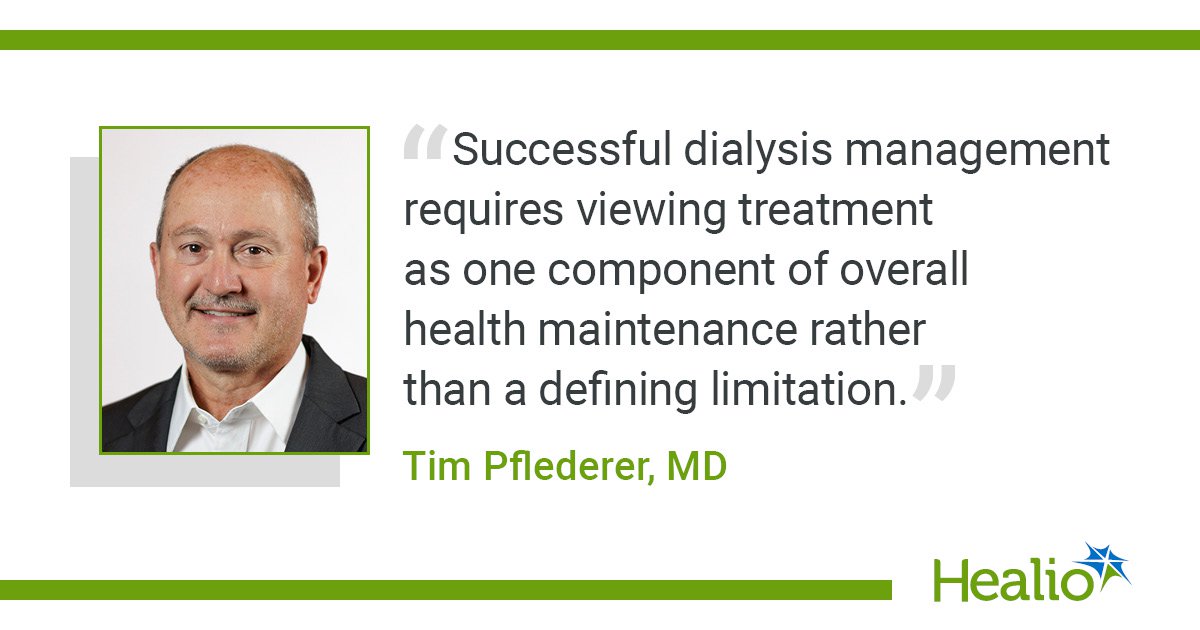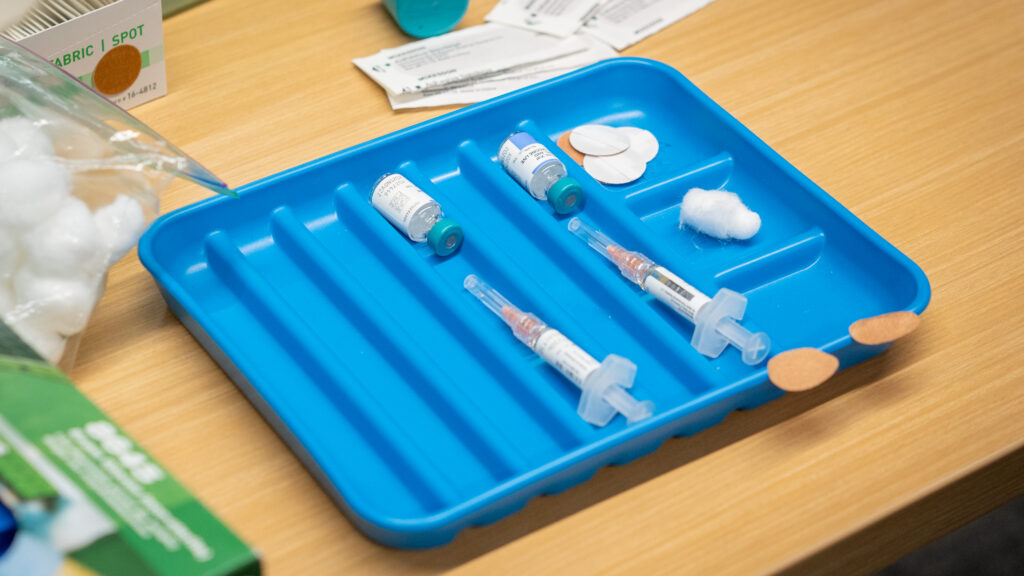October 01, 2025
5 min read
Key takeaways:
- Value-based care prioritizes education, prevention and longitudinal care management.
- Proactive management can extend and improve lives.
- Patients gain understanding of how to cope with dialysis and maintain quality of life.
Beginning dialysis is the start of a major life transition for many Americans impacted by chronic kidney disease.
About two in 1,000 people in the U.S. are living with end-stage kidney disease and require dialysis or transplant, and an increasing number of people are living with more than one chronic disease. As a result, we must adapt the way we manage chronic conditions to meet the needs of today’s patients. One way we can change the current approach is through the implementation of value-based care.

Value-based care prioritizes education, prevention and longitudinal care management in contrast to a traditional fee-for-service model that relies on episodic care and incentivizes delivering more services. With more effective, educational and holistic care resulting from a value-based approach, patients will gain a better understanding of how to cope with the dialysis treatment that is crucial for maintaining their quality of life and a sense of normalcy during a pivotal time in their lives.
The transition from CKD to end-stage renal disease can be overwhelming, but patients can feel more empowered and regain control with the right preparation and resources. The best way to prepare for and cope with dialysis is to educate, engage and expand. With this framework, patients can set themselves up for physical, mental and emotional success during what is well known to be a challenging experience.
Education as empowerment
The transition to dialysis often brings feelings of fear and uncertainty, leading many newly diagnosed patients to withdraw mentally rather than seek out information. Early and regular education can serve patients well as they adapt to a new routine.
Understanding the stage of one’s disease and the available treatment options, along with what to expect during the transition to dialysis, can transform patients’ mindset during the time leading up to their first treatment.
Furthermore, knowledge from trusted sources can empower patients to make more informed decisions about their care. Whether they have chosen home or in-center dialysis or medical management without dialysis, learning about the procedures, equipment and their own active role in the process can reduce any feelings of helplessness.
For patients beginning in-center dialysis, taking a trip to the facility beforehand and meeting staff members can help them know what to expect and better acclimate ahead of their first day. Having the opportunity to speak with a peer who has gone through this transition can be tremendously helpful.
The more patients understand about their condition and treatment, the better equipped they become to participate actively in their care journey. This preparation can even extend beyond medical knowledge to include other factors like understanding insurance coverage, transportation arrangements, and flexibility within scheduling processes. This level of ongoing education is inherent to value-based care.
Taking control with active engagement
Active participation in treatment represents another key aspect of smooth transition into dialysis. Patients who engage with their treatment process often experience an improved quality of life and enhanced well-being, rather than becoming passive recipients of their care.
Home dialysis offers unique advantages for those patients who can pursue this option, allowing treatment to integrate into existing daily routines rather than having to order life around a dialysis schedule. Regardless of treatment choice, patient engagement is still crucial. Understanding the dialysis machinery, asking questions during sessions and learning about their specific care plan can also provide increased benefits to patients before and during the treatment process.
Building relationships with the dialysis care team and others undergoing similar treatment can also create a supportive environment where patients feel more comfortable seeking clarification and expressing their questions or concerns. While staff members are busy serving multiple patients, they are important to answer questions and provide guidance. In a value-based care model, another resource for answers is from the care manager or navigator, who can serve as a liaison with the dialysis staff.
Independence can even extend to learning technical skills when appropriate. Patients can find empowerment in performing tasks like cannulating their own dialysis access or full self-care, including machine set up and take down in patient-centered dialysis facilities. Managing medications, monitoring fluid balance and being creative in diet choice despite restrictions can all be empowering — especially when supported by a value-based interdisciplinary team. Active involvement in decisions and care delivery fosters a sense of control for patients that positively impacts physical and emotional well-being. It does not have to be about following the rules but rather considering options and charting one’s own path.
Family involvement can play an equally important role in successful engagement. Including loved ones in the care process creates a robust support system that extends beyond medical appointments to encompass daily life management and much-needed emotional support. The value-based care team is a resource to families as well as patients.
Life beyond treatment
Dialysis treatment can severely restrict a patient’s life. Ultimately, dialysis should fit into one’s life, rather than life revolving around dialysis.
Maintaining connections with friends and loved ones and continuing to pursue activities and interests that provided meaning before treatment are essential for well-being. Whether engaging in hobbies like fishing, maintaining travel plans or prioritizing family time, patients should continue to participate in activities that bring joy and fulfillment to their lives.
That said, realistic planning around treatment schedules and energy levels is also essential. Patients should anticipate lower energy on treatment days and learn to maximize good days for meaningful activities. This balance will help prevent dialysis from becoming the sole focus of daily life. Value-based care is holistic care. Patient goals are front and center. Mental health support is readily available. Quality of life is enhanced by access to the broader team.
The vital role of physical activity
CKD and dialysis often create cycles of fatigue that can make physical activity challenging. But staying active provides crucial benefits, including maintained muscle strength, improved appetite and better sleep quality, which are all critical to quality of life.
Exercise does not require intensive gym sessions or complex routines. Simple, consistent activities like daily walking can provide significant benefits without being overly complicated or strenuous. The key lies in integrating manageable movement into daily routines while respecting the body’s need for rest after treatment sessions.
Sleep challenges also affect many dialysis patients, and regular physical activity can contribute substantially to improved sleep quality. Creating sustainable activity patterns that accommodate treatment schedules and energy fluctuations will help break the cycle of fatigue and inactivity that often accompanies chronic illnesses.
Patients should approach activity with flexibility, allowing for rest when needed, while maintaining commitment to regular movement. This balanced approach supports both physical and emotional well-being throughout their treatment processes.
A proactive approach to kidney care
The shift toward a value-based care model is improving lives. This approach focuses on comprehensive care that addresses not just the immediate need for dialysis, but the broader aspects of living with kidney disease.
Value-based care aligns naturally with the “educate, engage and expand” approach to create a holistic model that benefits both patients and providers — emphasizing quality outcomes over episodic visits.
Value-based care fosters patient engagement. When patients actively participate in their own care, they become willing partners with providers in pursuing an improved quality of life. This creates a positive cycle where patients are in control of their care, leading to better outcomes. When patients are educated and empowered to meet their goals, quality of life improves.
Successful dialysis management requires an overall plan of care aimed at the patient’s goals. It should not define the person, and limitations must be minimized by presenting all options. With proper education and active engagement, patients can maintain fulfilling lives while managing ESKD. The journey through dialysis treatment presents challenges, but it does not have to eliminate living well. Value-based kidney care prioritizes overall well-being and brings the resources to ensure patients can navigate their treatment while preserving the activities and relationships that make life meaningful.
For more information:
Tim Pflederer, MD, is chief medical officer at Evergreen Nephrology. He can be reached at tpflederer@evergreennephrology.com.










Good read — the key takeaways were especially helpful.